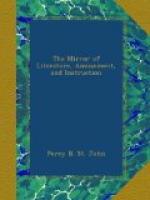* * * * *
OLIVER GOLDSMITH.
A person named Goldsmith, who stated himself to be a nephew of the great Oliver Goldsmith, died a short time since of cholera, in the country. A correspondent of the Morning Herald observes, the assertion may be true, and states that Dr. Goldsmith had a brother, whose name he thinks was Charles, and whom he met in public company about thirty years since. In person he resembled the poet, and was a man of some pleasantry, sang a tolerable song, and, like his brother, had a good deal of oddity in his manner. He then resided at Somer’s Town, and as the correspondent was informed, had been many years in the West Indies, whence he came to England possessed of a small independence. Some years since the correspondent made inquiry at Somer’s Town for Charles Goldsmith, but was told that he had left his residence there for some years. He is anxious for some information respecting the latter history of the poet’s brother: he has a faint idea of hearing he had some children by a native of the West Indies, and he thinks it probable that the first-named individual, lately deceased, might have been one of them. The settlement of this point may not be of general importance; but it leads the correspondent to mention that in the Temple churchyard, where he remembers the burial of Goldsmith, there is no stone or other memorial to mark his grave. So posterity, for nearly threescore years, have treated a man of genius, who, to quote Dr. Johnson’s opinion, left no species of writing untouched, and adorned all to which he applied himself. “How different,” observes the above correspondent, “the attention and honours paid to the memory of Walter Scott, scarcely cold in his coffin! a more voluminous writer certainly, but not a superior genius to the author of the Deserted Village and the Vicar of Wakefield.” Goldsmith died in the Inner Temple. Aikin says he was buried with little attendance in the Temple church; the correspondent of the Herald states, in the churchyard, so that the poet’s biographers are not even agreed where he was buried. Yet, since his death, thousands of pounds have been expended in restoring the architecture of the Temple church, and one hears everlastingly of the rare series of effigies of Knights Templars: but a few pounds have not been spared for a stone to tell where the poor poet sleeps. True it is, that a monument has been erected to his memory in Westminster Abbey, with a Latin inscription, by Dr. Johnson, but the locality of his actual resting-place is untold. We may say with equal truth and justice—
Oh shame to the land of his birth!
Philo.
* * * * *
THE SAVOYARD.
By E.B. Impey, Esq.
[The following ballad is founded on the melancholy fact of a Savoyard boy and his monkey having been found starved to death in St. James’s Park during the night of a severe frost.]




